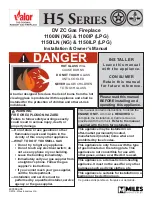
Page 16 of 19
MW38-DV Modular Fireplace
P/N XG0112
Maintenance
WARNING:
Do not attempt to clean glass when hot.
Do not clean glass with abrasive materials as any glass
etching may cause premature glass failure.
CAUTIONS
Fireplace gas control must be in the “OFF” position and pilot
and main burners extinguished when cleaning appliance with
a vacuum.
Doors and logs can get very hot. Handle only when cool.
General
Have the fireplace installation inspected yearly, including a visual
check of the vent system, the burner and the pilot flame. For your
convenience a 1/8" manifold pressure tap is supplied on the gas
valve for a test gauge connection. See Figure 26.
For
Natural Gas
this appliance requires a minimum inlet pressure
of 5.5" W.C. and a manifold pressure of 3.5" W.C.
For
Propane Gas
this appliance requires a minimum inlet
pressure of 11" W.C. and a manifold pressure of 10" W.C.
Always keep the fireplace area clear and free of combustible
materials, as well as gasoline and other flammable vapours and
liquids.
Do not use this appliance if
any part has been under water
.
Immediately call a qualified service technician to inspect the
appliance and to replace any part of the control system and any
gas control which has been under water.
Operation
Lighting Instructions
See pages 13 and 14.
Burner Adjustment
The Wildfire is equipped with an adjustable burner, allowing you to
raise or lower the flames. To adjust the flames, locate the black knob
marked 'Hi-Lo', in the centre of the gas control valve (See Figure 25).
To raise the flame height, turn the black knob (located behind
the lower trim)
counterclockwise
.
To lower the flame height, turn
clockwise
.
Gas Control Knob
(Shown in "Pilot" postion.)
'Hi-Lo' Adjustment Knob
Figure 25.
'Hi-Lo' Adjustment on Model MW38-DV gas valve.
Cleaning
When the fireplace is first activated, there may be some smoking and
a visible film may be left on the glass. This is a normal condition, and
is the result of burning of protective coatings on new metal.
Glass must be cleaned periodically to remove any film (which is a
normal biproduct of combustion) which may be visible. Film can
easily be removed by removing the door, as shown on page 12.
Handle the door carefully, and clean it with non-abrasive glass
cleaners. One of the most effective products is Kel Kem.
Silicone seals on inner door during initial firing will "off gas",
leaving a visual deposit of a white substance on combustion
chamber walls. This can easily be removed using normal
household products.
Use a vacuum cleaner or whisk broom to keep the control
compartment, burner, and firebox free from dust and lint.
Logs may be cleaned periodically with a vacuum to remove soot
or other contaminates.






































